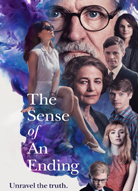Review: The Sense of an Ending
 Monday, March 20, 2017 at 12:30PM
Monday, March 20, 2017 at 12:30PM  Elliptical and enigmatic, The Sense of an Ending has the quality of a mystery, but one that raises more questions than it answers. That is, without a doubt, fully intentional. It’s a film that’s designed to make you go “hmm,” not “aha,” and there’s something admirable about how studiously it avoids going for an obvious narrative or emotional knockout punch. But by the same token, there’s something a little unsatisfying about it, too.
Elliptical and enigmatic, The Sense of an Ending has the quality of a mystery, but one that raises more questions than it answers. That is, without a doubt, fully intentional. It’s a film that’s designed to make you go “hmm,” not “aha,” and there’s something admirable about how studiously it avoids going for an obvious narrative or emotional knockout punch. But by the same token, there’s something a little unsatisfying about it, too.
Based on the Booker Prize-winning novella by Julian Barnes, the film centers on an aging Londoner, Tony Webster (Jim Broadbent), who, upon being notified of an unexpected legacy, finds himself revisiting his memories of an incident from his youth and eventually coming to grips with the fact that he’s never fully acknowledged or even recognized the truth of what really happened...

Even that summary implies the truth is dramatically revealed, when it would be more accurate to say that the truth isn’t so much revealed as suggested, so quietly and obliquely it hardly feels like “truth” in the sense of something certain and final—the sense of an ending, if you will. This anticlimactic climax appears to be characteristic of the book (which I have not read) as well. It’s the journey of self-reckoning, not so much the destination, that resonates.
If the film fails to reproduce the novel’s slow-burn effect, it’s not for lack of trying. Working off an adaptation by British playwright Nick Payne (Constellations), director Ritesh Batra (The Lunchbox) moves the narrative forward with more deliberateness than speed, though he toggles smoothly enough between past and present, using some interesting visual cues as both segues and echoes—whether it’s fried eggs, a stopped watch, or a vintage Leica camera. Batra and Payne also lean a good deal on the supporting characters to underscore just how warily we should view Tony, who’s the walking definition of an unreliable narrator and a frankly rather exasperatingly self-absorbed protagonist for most of the movie.

The cast, of course, is top-notch: in addition to the always-reliable Broadbent, Charlotte Rampling lends emotional gravitas to Veronica, Tony’s first love, even if she feels just slightly underdeveloped for such an important character. In contrast, in just a few tense scenes – which turn out to be some of the most memorable in the movie – Emily Mortimer registers a strong presence as the younger Veronica’s mother, Sarah, whose unsettling allure lingers in Tony’s subconscious long after the last time he sees her. But it’s Harriet Walter who steals the show and leavens the film as Margaret, Tony’s ex-wife and ongoing emotional sounding board, equally capable of providing a sympathetic ear and a much-needed reality check, laced with just a drop of that good old Harriet Walter acid. Michelle Dockery fares less well as their very pregnant daughter, Susie, mainly because she feels more like a device, shoehorned in for thematic reasons, than a fully realized character.
Susie’s flatness as a character, in fact, crystallizes my reservations about the film as a whole. It’s Tony’s relationship with her that’s most directly affected by what he learns from the past and that functions as the vehicle for his present-day redemption. The redemption, however, feels unearned, because it’s never entirely clear what exactly Tony does learn from the past—other than that he’s clueless and his memory is selective and self-serving, a theme that’s been more richly explored in other films. That’s not a knock on Broadbent, who does his best to evoke Tony’s evolution from curmudgeon to creep-in-denial to chastened family man. If that progression feels less than convincing, it’s due to a fundamental lack of clarity in the film’s conception of his character or his moral culpability; sure, he’s a jerk, but how much, really, is he to blame for the actions of others? While this ambiguity might again be reflective of the source material, I couldn’t help thinking some of it might be due to the filmmakers’ excessive reluctance to dictate the audience’s perspective. The combination of Batra’s natural restraint and Payne’s penchant for unanswerable questions, while at first glance a great match for the book, seems to have muted its impact. There’s a fine line between understated and inscrutable, and The Sense of an Ending ultimately errs on the side of the latter.

Grade: B-
Related: Interview with director Ritesh Batra



Reader Comments (3)
This is the worst poster I've ever seen
cal roth - ha ha! it is definitely terrible. Reminds me a little of a paperback cover from the '70s.
They seem to want to include everyone in the poster - yes the design seems a bit cluttered